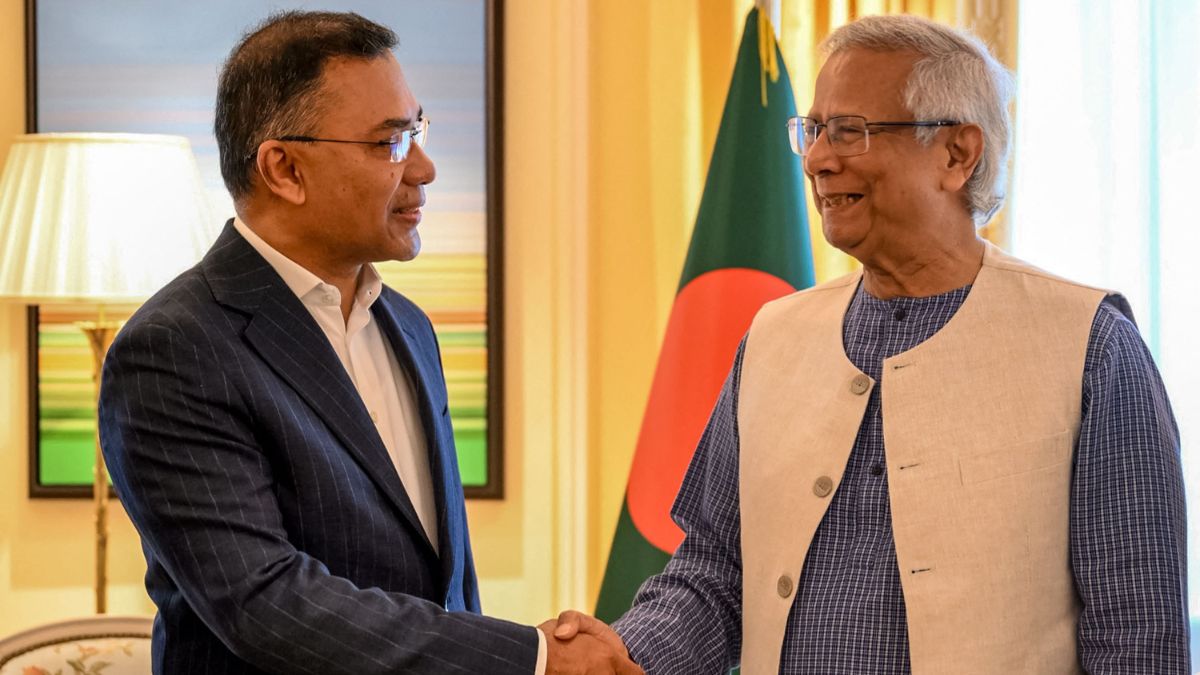Bangladesh elections: How Muhammad Yunus, Tarique Rahman set stage for February, as voting age, electoral rolls expected to remain unchanged

The voting age in Bangladesh is expected to remain unchanged at 18, and the electoral rolls will not be freshly updated, sources said after a significant meeting in London between the interim government’s chief advisor, Professor Muhammad Yunus, and the acting chairperson of the Bangladesh Nationalist Party, Tarique Rahman.
The decisions, finalised on Friday, are being seen as key steps towards fast-tracking the country’s transition to an elected government by mid-February 2026.
The London meeting, which took place in a neutral and cordial atmosphere, marked the first direct engagement between the two sides. According to people familiar with the discussions, both parties expressed a willingness to negotiate and remain flexible.
“This was the ice-breaker everyone was waiting for,” said a senior official aware of the matter. “Professor Yunus showed readiness to move forward, and the BNP demonstrated openness to an inclusive process.”
Sources credited BNP chairperson Khalida Zia for shaping this middle ground, emphasising her consistent message that the two sides must collaborate to bring about a democratic transition.
The former Prime Minister was also of the view that elections in mid-February would be convenient for people, owing to a favourable climate season as well as it being a period ahead of the holy month of Ramadan.
“It’s a date that gives all parties time to prepare while ensuring a peaceful environment,” a person aware of the negotiations explained.
Besides the roadmap for elections, both parties also discussed the crucial need to fast-track the trial process for those accused of violence during the student-led protests in July 2024 and initiate vital pending reforms.
While the judicial process will remain independent, the government has agreed to speed up everything that is already on its table, sources said. Meanwhile, at the heart of the reforms is the commitment to strengthen the Election Commission and its linkages with local field administration.
The second set of reforms includes police reforms to ensure law and order during the election period and ensure the rule of law on the streets.
“There is no luxury of time,” said an insider. “People across political lines want to see Bangladesh return to democratically elected government, and this can’t happen with delays over the voter list or voter age. The time frame is tight, and so is the expectation.”
The administrative reforms already agreed upon by all stakeholders will also be fast-tracked, sources said. In a gesture of reassurance, the BNP is said to have conveyed to Dr Yunus that the young leaders who led the “July revolution”—and what it symbolised—would always be acknowledged for their contribution.
However, the demand from the newly formed National Citizen Party (NCP) to delay elections has not been accepted.
“There is room for everyone’s participation,” said a BNP leader. The BNP, now emerging as the largest political force after the Awami League’s activities were significantly curtailed, reiterated its stand for inclusive elections.
Steering clear of the issue of whether “inclusivity” also means participation of the Awami League in the election process, sources in the BNP stated that the curtailment of activities of the Awami League was a decision taken by the Interim government.
Meanwhile, Dr Ziauddin Hyder, advisor to the BNP chairperson and a former World Bank senior official, said that the party was committed to stability and to safeguarding people’s voting rights.
“Within the spirit of nationalism, we believe Bangladesh is moving towards a stable and forward-looking future.”
Notably, the London meeting has also set the stage for the return of Tarique Rehman to Dhaka.
“The final takeaway from the meeting was the need to avoid the mistakes of the past and focus on a peaceful democratic transition to an elected government whose focus would be knowledge-based, development-driven governance for a forward looking, stable and secure Bangladesh,” Hyder explained.
World